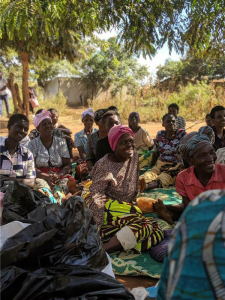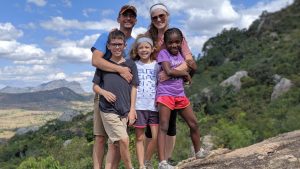Widows in Malawi often experience abuse and shame from their community. After the deaths of their husbands, the women’s lives become extremely difficult—emotionally, financially and societally.
Amess Nthala started Hope for Widows after she experienced firsthand the abuse and loss that widows experience in their culture. Nthala was widowed at the age of 26. At the time, Nthala and her husband were both students at the Baptist Theological Seminary of Malawi.

Nthala started Hope for Widows to provide community and to empower widows to financially support their families. The ministry is connected to a church in Malawi.
The women meet weekly to study the Bible. The women come from both Christian and Muslim backgrounds. IMB missionary Catherine Allison said regardless of their faith background, all women hear the same truths from Scripture.
Nthala and the women at Hope for Widows developed a microfinance program where they contribute financially to one another and support the launch of members’ new small businesses. As these businesses earn a profit, the recipient contributes back to the microfinance program.
Allison said the women also hold one another accountable to reach goals they set.
“You said you were going to save up money to put a roof on your house. How’s that going?” they ask. Or “Were you able to sell the number of green peppers you were hoping to sell this week?”
The widows are also trained to sew, knit and make jewelry and doormats.

Women who are a part of the Hope for Widows ministry listen to IMB missionary Catherine Allison share about God’s unchanging nature and His provision during times of need.
All of these activities take place in Nthala’s living room.
In light of lockdowns due to COVID-19, the widows expressed fear and concern about their ability to provide for their families.
Malawi is a hand-to-mouth society; this is especially true for widows who are the primary, and often the sole, breadwinners in their families. The closure of their businesses because of the virus threatens the income for the widows and their families.
Allison said fears of starvation far outweigh fears of the virus itself.
However, these fears were alleviated thanks to funds from a Lottie Moon Challenge (LMC) fund. Thirty-six orphans and their mothers received 77 pounds of maize and 11 pounds of beans.
Nthala asked Allison to share a word of encouragement to the women after they received the food.
“I reminded the ladies that, sickness or death or famine or harvest, we can trust in God’s steady, unchanging character. We can look to the cross and remember the greatest love that ever was, and we can look to the empty grave to remember the power of this great God we serve,” Allison shared with the women.

Matt and Catherine Allison and their children have served in Malawi since December 2018.
Several women voiced an “amen.”
“The same God who conquered death itself is now sitting in heaven. COVID-19 doesn’t scare Him, nor is He surprised,” Allison said. “The power He has today over sickness and death and every kind of brokenness is the same power that raised Jesus from the grave, and so we can rest. We can have true hope.”
The widows of Hope for Widows all have testimonies of how the Lord cared for them in times of trial. They continue to pass that hope on to other women and their children who are broken and grieving.
Martha Chitsamba was an active member of Hope for Widows until her death from injuries sustained in a car accident.
Allison said the women of Hope for Widows were not about to end their support of Martha’s family after she passed away. From their meager incomes, the widows support Chitsamba’s teenage daughters, Chikondi and Patricia.
“Because of the generosity of those who gave to this LMC fund, Chikondi and Patricia were among those who received food this month, relieving one more unnecessary burden from their young minds,” Allison said.
Nthala, Allison and the women of Hope for Widows attest to how the Lord has always been faithful.
“Even those of us who might find themselves on the margins of society, He sees and knows and cares intimately, and His goodness is unyielding, COVID-19 or not,” Allison said.

